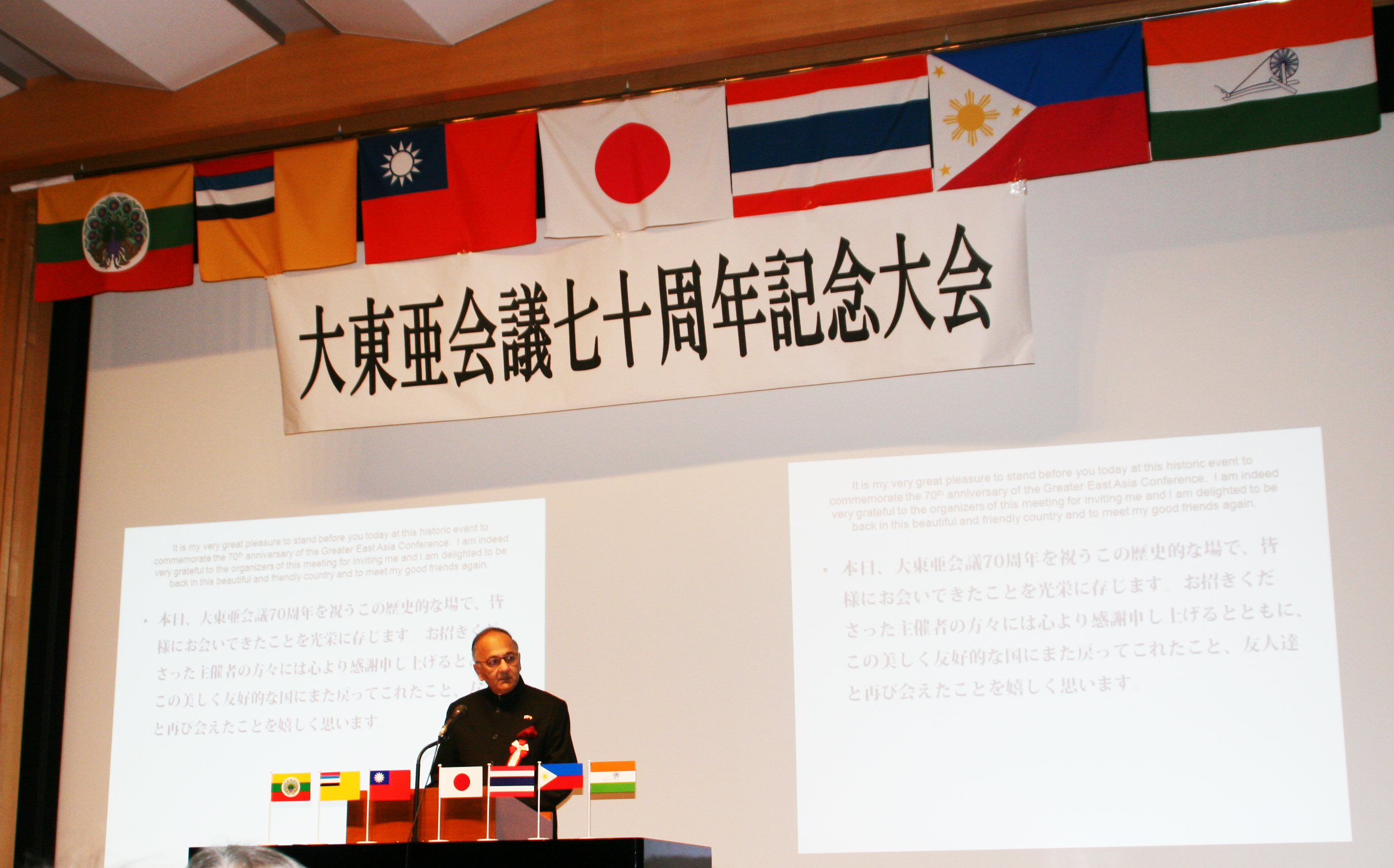 以下、『月刊日本』2013年12月号に掲載された記事とその英訳を転載します。
以下、『月刊日本』2013年12月号に掲載された記事とその英訳を転載します。
人類文明創造へのアジア人の志
大東亜戦争下の昭和十八年十一月五日、六日の両日、東京で大東亜会議が開催された。東條英機総理、中華民国(南京)国民政府の汪兆銘行政院長、満州国の張景恵総理、フィリピンのホセ・ラウレル大統領、ビルマのバー・モウ総理、タイのワンワイタヤーコーン親王、オブザーバーとして自由インド仮政府首班のチャンドラ・ボースが参加し、列強の植民地支配を痛烈に批判した。
それから七十年目を迎えた平成二十五年十一月六日、憲政記念館で「大東亜会議七十周年記念大会」が開催された。頭山興助氏と加瀬英明氏が開催実行委員会共同代表を務め、チャンドラ・ボースの兄の孫のスルヤ・ボース氏、元ニューヨークタイムス東京支社長のヘンリー・ストークス氏らが記念講演を行った。
スルヤ・ボース氏は、チャンドラ・ボース氏が大東亜会議で発した次の言葉を紹介した。
「みなさん、これは征服者たちが戦利品を分配するための会議ではありません。これは強国が弱小国を食い物にしようと陰謀を企むための会議ではありませんし、弱い隣国から何かをだまし取ろうとするための会議でもありません。これは自由となった諸国民の会議であり、聖なる正義の原則、国家主権、国際社会での相互扶助、相互援助の原則に基づいて、新世界秩序を生み出そうという会議なのです」
このボースの演説に示されるように、大東亜会議で発せられた各国代表の言葉には、単に植民地解放と人種平等を訴えるだけではなく、当時の世界秩序を律していた西洋近代の価値観自体に対する批判が込められていたのである。帝国主義、植民地主義、人種差別をもたらした西洋近代の価値観に代わるアジア的価値観の表明である。
確かに、明治以来の日本政府の政策を振り返れば、列強に配慮するあまり、植民地支配からの解放を目指すアジアの志士に背を向けた時期があったこと、外交政策に列強の模倣と受け取られかねない側面があったこと、そして大東亜戦争において軍の一部にわが国が唱える理想に矛盾するような行動が見られたこと──といった問題があった。
しかし、大東亜会議において語られた各国代表の言葉には、西洋近代文明の在り方を批判し、より健全な人類文明を創造していこうという志が確かに表現されていたのである。
東條首相は、「大東亜における共存共栄の秩序は、大東亜固有の道義的精神に基づくべきものであります」、「大東亜の精神文化は最も崇高、幽玄なるものであります、今後愈々これを長養醇化して広く世界に及ぼすことは、物質文明の行き詰まりを打開し、人類全般の福祉に寄与すること尠からざるものありと信ずるのであります」と語った。
ラウレルはこの東條の言葉を受けて「東洋は人類文明の揺籃であり、西洋に対しその宗教と文化とを与えた」と語り、ワンワイタヤーコーンは「アジア大陸は人類発展の源である」と言いきった。
東條は、「自己の繁栄の為には不正、欺瞞、搾取をも敢えて辞せざる米英」と表現し、汪兆銘は大東亜共同宣言が「欧米の功利主義的見解を一掃した」と語り、欧米の政策の背後にある価値観を批判した。
つまり、大東亜会議は、西洋近代の物質至上主義、効率万能主義を批判した岡倉天心の有名な一句「アジアは一つ」の内実が示された瞬間でもあったのではなかろうか。
共同宣言に結実した大東亜会議の理念は人々の記憶から消されたが、その後の国際政治に重要な役割を果たすことになる。例えば、一九五五年にインドネシアのバンドンで開催されたアジア・アフリカ会議や一九六一年に発足した非同盟諸国会議の理念にも、それは脈々と継承されているのである。
—Meeting Held to Commemorate 70th Anniversary of Greater East Asia Conference—Aspiration of Asian People to Create Human Civilization
The Greater East Asia Conference was held in Tokyo on November 5–6, 1943, during the Greater East Asia War. The participants were Japanese Prime Minister Hideki Tojo; Wang Jingwei, president of the Reorganized National Government of China in Nanjing; Zhang Jinghui, prime minister of Manchukuo; Jose P. Laurel, president of the Philippine Republic; Ba Maw, head of state of Burma; Prince Wan Waithayakon of Thailand; and, attending as an observer, Chandra Bose, head of the Provisional Government of Free India. They fiercely criticized the colonialist rule of the Western powers.
Seventy years after the conference, on November 6 of this year, a meeting to commemorate the 70th anniversary of the Great East Asia Conference was held at the Kensei Kinenkan in Tokyo. Mr. Okisuke Toyama and Mr. Hideaki Kase served as co-representatives of the organizing committee, and keynote speeches were given by Mr. Surya Kumar Bose, the grandnephew of Chandra Bose, and Mr. Henry Stokes, former Tokyo bureau chief of the New York Times.
Mr. Surya Kumar Bose quoted from Chandra Bose’s speech at the conference as follows: “Your Excellency, this is not a conference for dividing the spoils among the conquerors. This is not a conference for hatching a conspiracy to victimize a weak power, nor is it a conference for trying to defraud a weak neighbor. This is an assembly of liberated nations, an assembly that is out to create a new order in this part of the world, on the basis of the sacred principles of justice, national sovereignty, reciprocity in international relations, and mutual aid and mutual assistance.”
As shown by Bose’s speech, the words of the national representatives at the Greater East Asia Conference were laced not only with appeals for things like the liberation of colonies and racial equality but also with criticism of the modern Western values that governed the world order at that time. They proposed replacing these modern Western values, which had brought about imperialism, colonialism, and racial discrimination, with Asian values.
There were problems for sure. Looking back at the policies of the Japanese government from the Meiji period (1868–1912), there were times when it had given too much consideration to the Western powers and turned its back on Asian patriots aiming for liberation from colonial rule; sometimes Japan’s diplomatic policies could be seen as an imitation of those of the Western powers; and during the Greater East Asia War, some elements in the Japanese military behaved in ways that were contradictory to the ideals advocated by our country.
Nevertheless, the speeches by the national representatives at the Greater East Asia Conference criticized the modern civilization of the West and expressed their aspirations to create a sounder human civilization.
Japanese Prime Minister Tojo said “This new order of Greater East Asia is to rest upon the spirit of justice that is inherent in Greater East Asia” and went on, “. . . the spiritual essence of the culture of Greater East Asia is the most sublime in the world. It is my belief that in the wide diffusion of the culture of Greater East Asia by its further cultivation and refinement lies the salvation of mankind from the curse of materialistic civilization and our contribution to the welfare of all humanity.”
In response to Prime Minister Tojo’s speech, Philippine President Laurel said that the “East was the cradle of human civilization and had given the West its religions and cultures,” and Thai Prince Wan Waithayakon remarked that “the Asian continent is the fountainhead of humankind’s development.”
Prime Minister Tojo also stated that “the United States and Britain . . . do not hesitate to practice injustice, deception and exploitation in order to promote their own prosperity.” And President Wang Jingwei of the Reorganized National Government of China similarly criticized the values behind the policies of the West, saying that the declaration of the Greater East Asia Conference “has swept away the West’s utilitarian views.”
In other words, the Greater East Asia Conference was a moment in history demonstrating the truth behind the famous remark by the Japanese scholar Tenshin Okakura (1862–1913) that “Asia is one.”
The principles of the Greater East Asia Conference, which were embodied in its joint declaration, have faded from people’s memory, but they played an important role in subsequent international politics. Their legacy was continued, for example, in the principles of the Afro-Asian Conference held in Bandung, Indonesia, in 1955 and the Non-Aligned Movement inaugurated in 1961.
Mr. Surya Kumar Bose is one of grand children of brother of Netaji Subhas Chandra Bose and made a speech at the conference commemorating 70th Anniversary.
The leaders who participated in the Greater East Asia Conference: (from left) Ba Maw, Zhang Jinghui, Wang Jingwei, Hideki Tojo, Wan Waithayakon, Jose P. Laurel, and Chandra Bose
